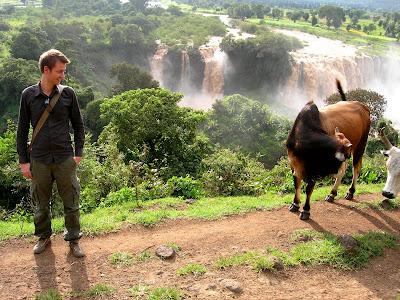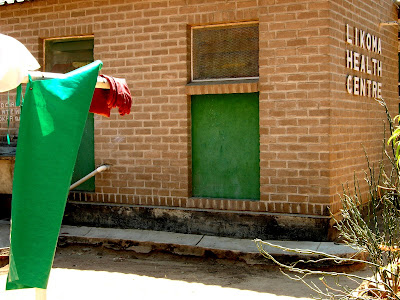I arrived in Addis with my friends Anne and Carl on the 19th. We spent the weekend eating really good food, staying out way too late with Roger's new friend Tedy, shopping at nice shops, drinking phenomenal coffee, and all around enjoying the busy city that is Addis. Highlights from the weekend:
- An intense night of shoulder shaking on Saturday night. Just when I thought I had semi-mastered the Malawi hip-shake I go to Ethiopia where the object of dancing is to keep your lower body still and move you shoulders in ways that make you wonder if they're really attached. As you may guess, I'm not so good...
Roger has befriended a movie producer named Tedy and he was kind enough to take us out to all of the happening clubs in Addis. We ended up eating injera and meat at 3:30 am and going to bed around 6:30 am. whew!
- Drinking at least a liter of machiatos in cafes. Ethiopia is not only the original home of the coffee bean but it also used to be occupied (though not colonized) by Italy, the result: a fantastic assortment of really tasty coffee drinks served at charming cafes. The going price of a machiato? about 3 birr which equals about 35cents, why not have 2 or 3 in one sitting?
- Shopping shopping shopping. While I adore Lilongwe, there is something to be said about going into a store and the owners having more than one pair of those shoes that you want in stock. The odds of finding my size in Addis were much, much better :)
- Enjoying traditional Ethiopian food and honey wine in a fantastic restaurant with live music and dancers! Not to offend my regular Ethiopian restaurant in Boston but this was honestly the best Ethiopian food I've ever had. I'm already craving injera... (watch for a video posting of the amazing dancing soon)
- And shopping for beautiful handwoven cotten fabrics outside of town. I ended up with 5 new scarves to add to my wardrobe. Now seeing as how I don't really wear scarves, owning 5 of them seems a bit silly but perhaps they'll be making an entry into my daily wear soon!
 A majority of Ethiopians are Orthodox Christian and very religious, touring the churches is one of the main activies. I became facinated with the artistic depictions of Bible stories painted on the walls inside (painted around the 16th century). A bit graphic for church don't you think?
A majority of Ethiopians are Orthodox Christian and very religious, touring the churches is one of the main activies. I became facinated with the artistic depictions of Bible stories painted on the walls inside (painted around the 16th century). A bit graphic for church don't you think?
 Mulugeta then took me to Mercato. The largest market in Eastern/Southern Africa. We all know how much I love markets and this one was no exception, but due to the enormous size it was very helpful to have a guide. It is said that you can buy anything at this market, from AK-47s to potatoes and goats. I myself stuck to incense, spices, raw coffee and jewelry. Thanks to Mulugeta I got some pretty good deals and learned a ton about what that white powdery stuff is and what the many uses are for berebery spice.
Mulugeta then took me to Mercato. The largest market in Eastern/Southern Africa. We all know how much I love markets and this one was no exception, but due to the enormous size it was very helpful to have a guide. It is said that you can buy anything at this market, from AK-47s to potatoes and goats. I myself stuck to incense, spices, raw coffee and jewelry. Thanks to Mulugeta I got some pretty good deals and learned a ton about what that white powdery stuff is and what the many uses are for berebery spice.I also visited a few museums while in Addis, one of which contains the skeleton of Lucy (the oldest skeleton every found). These museums were extremely interesting as Ethiopia is not only the cradle of human existence but also home to some 87 tribes, each with distinct cultural practices and ways of life. The only thing better would have been to travel out to each tribe and spend a few weeks learning how to stretch my lip around a lip plug or grind up tef to make injera. Now I've got a plan for my next visit!
On Friday Rog and I traveled up north to do a bit of touristy sight-seeing. First we flew to Bahir Dar on Lake Tana, home to tons of monestaries and really devout monks. We took a tour of a few of the monestaries (at least the ones I was allowed in to, some don't allow women to even set foot on the island so as not to "tempt" the monks). Most of the monestaries are located on islands or peninsulas around the lake so our transport consisted of a boat and a few bumps. Lake Tana is the source of the Blue Nile so after a few churches we took a car and a short hike to the Blue Nile Falls where we marveled at the amount of water pouring over the edge (and of course the surrounding wildlife).

 Sadly we discovered that the falls don't always appear so grand. The recent installation of an electric power plant next to the river usually diverts the water to produce electricity for the surrounding towns, diminishing the great falls to a mere trickle on most days (we just happened to be lucky enough to come on a day where the falls were "switched on"). Of course the environmentalist in me is mourning the loss of rare ecosystems and animal life below the falls, but the development dork in me has witnessed the enormous benefits that electricity can bring to human lives.
Sadly we discovered that the falls don't always appear so grand. The recent installation of an electric power plant next to the river usually diverts the water to produce electricity for the surrounding towns, diminishing the great falls to a mere trickle on most days (we just happened to be lucky enough to come on a day where the falls were "switched on"). Of course the environmentalist in me is mourning the loss of rare ecosystems and animal life below the falls, but the development dork in me has witnessed the enormous benefits that electricity can bring to human lives.  Hmmm, a bit of a conundrum I'd say. Anywho, now that I've seen the Nile, my next task is to float down it!
Hmmm, a bit of a conundrum I'd say. Anywho, now that I've seen the Nile, my next task is to float down it!From Bahir Dar we flew to beautiful Lalibela, a town located high in the hills of Ethiopia that happens to be home to amazing feats of architectural genious. a.k.a the rock-hewn churches of Lalibela. We spent the majority of our day climbing around rocks that doubled as churches. According to our guide, most of the churches were believed to have been carved in the 13th century, around 800 years ago. And all of them are carved out of a single rock, some are free-standing, others attached to walls like caves, all of them are absolutely stunning. It was crazy to wonder around among ancient buildings that must have taken millions of man-hours to construct, some with intensely intricate carving detail and decoration.
 Most of the churches were dug down from ground level and go some 12 meters under ground, connected by super dark secret passage ways and tunnels.
Most of the churches were dug down from ground level and go some 12 meters under ground, connected by super dark secret passage ways and tunnels.  Incredible! My favorite was St. George's church but they all were immensly impressive.
Incredible! My favorite was St. George's church but they all were immensly impressive. 
 Equally impressive is the fact that service is still held at these churches and priests and monks were constantly wandering about. Within the compound there are also baptism pools and a fertility pool, which apparently works "a bit too well" for the women who are brave enough to be lowered into the green murky (and grassy) water...
Equally impressive is the fact that service is still held at these churches and priests and monks were constantly wandering about. Within the compound there are also baptism pools and a fertility pool, which apparently works "a bit too well" for the women who are brave enough to be lowered into the green murky (and grassy) water...
Of a different but still impressive architectural scope are the two story huts found scattered throughout Lalibela.
And lastly, Lalibela is seen as a kind of Orthodox Christian Mecca and remenants of some pilgrims were found in caves carved into the walls around the churches. Oddly the burial within a wall is not that uncommon, this one just happened to be open...
And now I am back in HOT Lilongwe, planning a few trips to the field, keeping plenty busy with the scheme and savoring my final months at UNICEF/Malawi. Cheers!

































